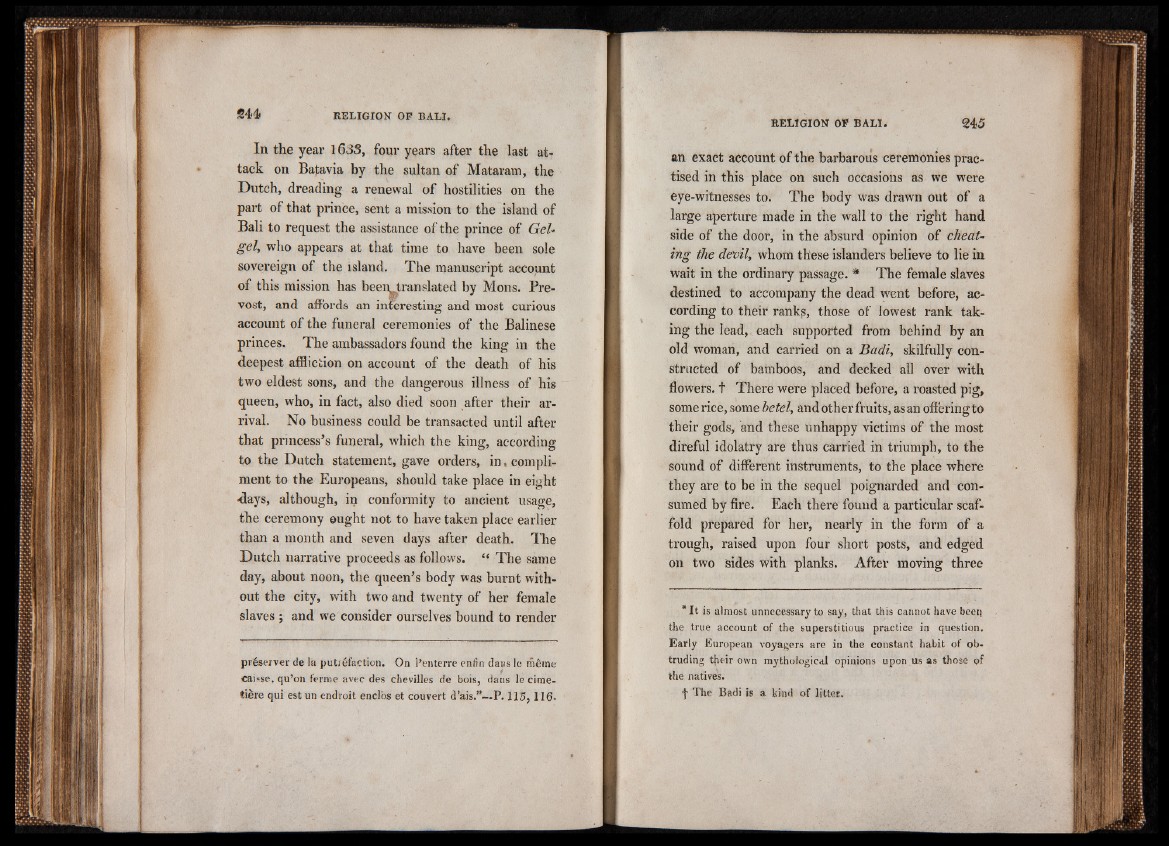
In the year 1633, four years after the last attack
on Batavia by the sultan of Mataram, the
Dutch, dreading a renewal of hostilities on the
part of that prince, sent a mission to the island of
Bali to request the assistance of the prince of Gel-
gel, who appears at that time to have been sole
sovereign of the island. The manuscript account
of this mission has beenjtran slated by Mons. Pre-
vost, and affords an interesting and most curious
account of the funeral cei’emonies of the Balinese
princes. The ambassadors found the king in the
deepest affliction on account of the death of his
two eldest sons, and the dangerous illness of his
queen, who, in fact, also died soon after their arrival.
No business could be transacted until after
that princess’s funeral, which the king, according
to the Dutch statement, gave orders, in, compliment
to the Europeans, should take place in eight
-days, although, in conformity to ancient usage,
the ceremony ©ught not to have taken place earlier
than a month and seven days after death. The
Dutch narrative proceeds as follows. “ The same
day, about noon, the queen’s body was burnt without
the city, with two and twenty of her female
slaves ; and we consider ourselves bound to render
préserver de la putréfaction. On l’enterre enfin dans le même
■caisse, qu’on ferme avec des chevilles de bois, dans le cimetière
qui est un endroit enclos et couvert d’ais.”—P. 115 ,116.
an exact account of the barbarous ceremonies practised
in this place on such occasions as we were
eye-witnesses to. The body was drawn out of a
large aperture made in the wall to the right hand
side of the door, in the absurd opinion of cheating
the devil, whom these islanders believe to lie in
wait in the ordinary passage. * The female slaves
destined to accompany the dead went before, according
to their rankp, those of lowest rank taking
the lead, each supported from behind by an
old woman, and carried on a Badi, skilfully constructed
of bamboos, and decked all over with
flowers, t There were placed before, a roasted pig,
some rice, some betel, and other fruits, as an offering to
their gods, and these unhappy victims of the most
direful idolatry are thus carried in triumph, to the
sound of different instruments, to the place where
they are to be in the sequel poignarded and consumed
by fire. Each there found a particular scaffold
prepared for her, nearly in the form of a
trough, raised upon four short posts, and edged
on two sides with planks. After moving three
* It is almost unnecessary to say, that this cannot have beep
the true account of the superstitious practice in question.
Early European voyagers are in the constant habit of obtruding
their own mythological opinions upon us as those pf
the natives.
j- The Badi is a kind of litter.